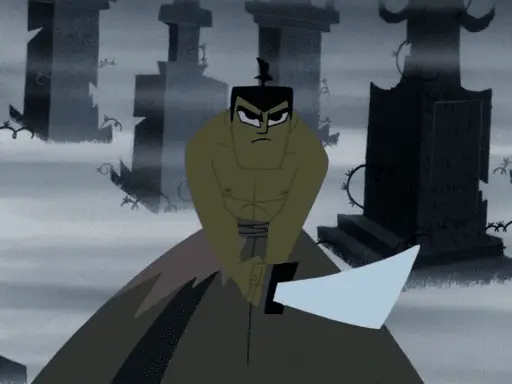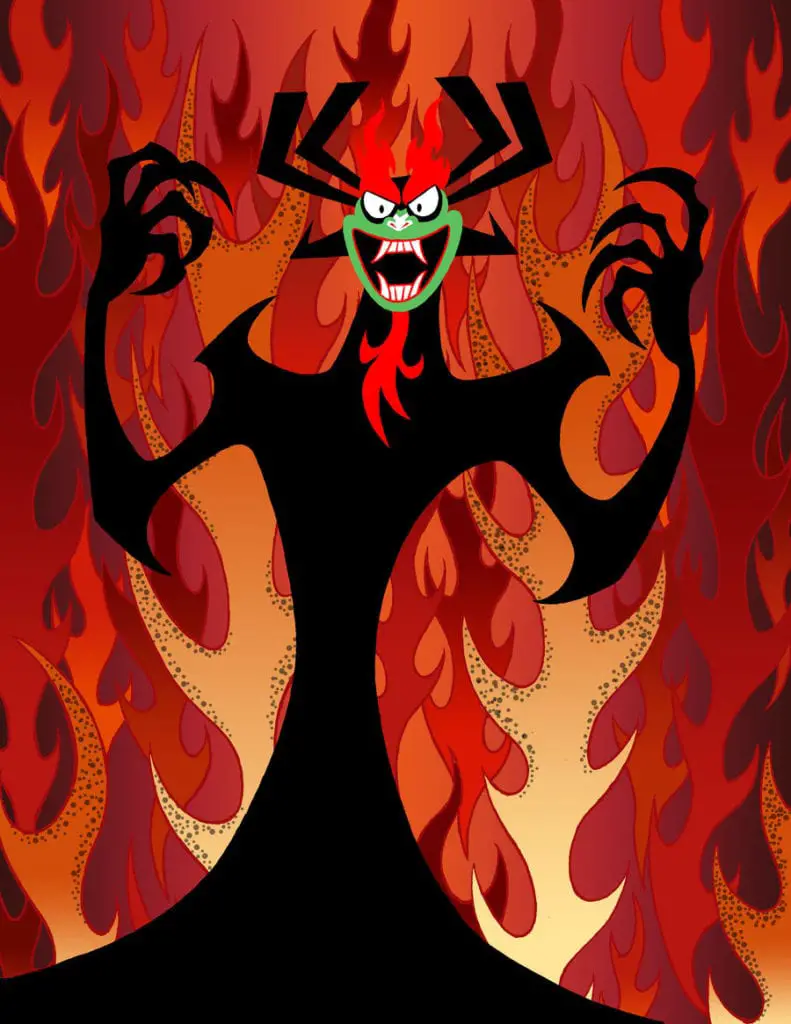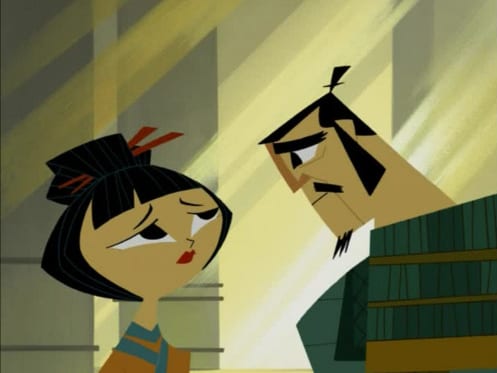In our first analysis, we looked at the use of minimalism in Samurai Jack. Now in this second part of out three-part series, we, Michał and Cameron (the writer formerly known as Nick) analyze the characters of Samurai Jack.
Someone unique about the series is how little recurring characters there are. Besides Jack and Aku, characters usually stay within the episode they’re introduced in, and rarely ever reappear. The only ones of note are the cartoonishly overblown Scotsman, and Jack’s Parents. It’d be far to say the stories Minimalist style extends into its characters as well.
Jack

Something that should be noted is that Jack isn’t his given name. It’s an equivalent of Bob (no offense to the Bobs out there) an okay, well-known name.
Jack is a very restrained man, in keeping with the show’s general minimalistic direction. He remains unflappable in even dire straits, and if he loses his temper, it means something has really pushed him. He’ll often apologize for people who don’t deserve it, simply to defuse a situation.
Temper aside, we see the hopelessness of his mission get to him sometimes. In “Jack and the Monks”, he despairs of ever reaching his goal, until he’s snapped out of it. When he encounters ruins of his home in “Jack Remembers the Past”, the emotions and memories overwhelm him… but when a robot arrives bearing a call for help, he immediately rushes off.
Which brings us to his other defining trait, which is his unwavering heroism. He never turns away from someone in need, even if it would impede or outright ruin his chances of returning to the past. In “Jack, the Monks and the Ancient Master’s Son”, he refuses to let two monks sacrifice themselves to buy him time. They were ready to make the ultimate sacrifice – but he wasn’t prepared to let them. Normally, a character who is so unquestioningly righteous and pure of heart might be boring. Jack makes it work. After all, the world Aku threw him into is one where Aku’s evil is law – Jack serves as a beacon of hope in it.
This doesn’t mean it doesn’t affect him, Jack is a very melancholic character at heart. He wanders the world in a desperate quest, trying to right hundreds of years of wrongs when he can. When we said that there are few recurring characters, one could argue it’s because Jack doesn’t let them close. After all, his goal is to leave them behind, and Aku wouldn’t hesitate to destroy them just to make him suffer. Early on, he grows somewhat close to a woman, Ikra, who’s after the same magic jewel… but she turns out to be Aku in disguise. It’s entirely possible it soured him on interpersonal relationships. He eventually develops a friendship with the Scotsman – perhaps because he’s already on the run from Aku, so Jack’s proximity changes little.
His interaction with the Scotsman, and some other characters provide opportunities for Jack to let his guard down a little. And we see that he’s not quite the dour, humorless warrior he tends to appear as. He is deeply honourable and stoic, but with a funnier side. We don’t get to see it often, though.
He’s not had the chance to really ever fully relax. Ever since Aku came out of his imprisonment, Jack has been in a constant state of fighting him. For almost his entire life, his goal has been to defeat this one foe. He’s been in a restless fight against a literal incarnation of evil. And yet, for all that, he keeps on going. There’s a tragic determination that underlies all his actions.
Aku

Aku is in many ways a foil for Jack. Where Jack is retrained, Aku is wrathful. Where he is proactive, Aku is lazy. Where he is humble, Aku is narcissistic. In fact, his most defining trait might just be his narcissism. Whether it demanding people build statues to him, brainwashing entire populations to worship him, or even telling petty stories about himself to kids, he almost entirely self-absorbed. So absorbed is he that he’ll call himself the Master of Evil.
Aku’s Fairy Tales may be the most direct example of this. This episode is spent with Aku indoctrinating masses of children into worshiping him for his heroic and amazing deeds and demonizing Jack for being immoral and evil. Every chance he gets he takes to destroy Jack’s character, and uphold himself as a morally righteous figure.
Being an incarnation of evil, Aku is also guilelessly cruel. He’s enslaved an entire world and destroyed the lives of its inhabitants. His world is chaotic, dark, and violent. His evil is so institutionalized that the people have no concept of a world where he isn’t king. The entire series goes to great lengths to showcase how terrifying and sad the world now is.
Aku’s over-the-top evilness comes back to bite him more than once. He would have caught Jack several times over if he hadn’t habitually screwed over everyone who works for him, or makes a deal with him. Maybe he doesn’t know how not to do that.
Aku is also a villain that you just likes to watch. The series takes advantage of its cartoonish nature to sometimes give Aku humorous and silly moment.
“Ha ha, fooled you.” -Aku
His insults, in combination with Mako’s voice acting can form into something both hilarious and childish. This, along with his cartoonish smile and creative mannerisms makes him an enjoyable villain to watch.
Secondary Characters

The Scotsman is one of the only characters who appear for more than one episode. He first appears as a rude braggart who picks a fight with Jack, but then joins forces with him to fight off bounty hunters – since he’s the second most wanted person on the planet, to Jack’s first. He’s the only human (as opposed to a primordial evil, robot, demon et cetera) to match Jack in hand-to-hand combat, as well.
Some episodes later, he reappears – we’ve heard it was because the viewers liked him so much. One way or the other, he asks Jack for help in freeing his wife from Celtic demons. Jack being Jack, he agrees to help him.
In the fourth season, the Scotsman gets an opportunity to return the favor. He encounters Jack on a ship, working as a waiter with no memory of the Scotsman, or his old life. Without hesitation, he pledges to help him, which eventually leads them both to the lair of three sirens, who had inflicted amnesia on Jack for trying to free their slaves. The two slay the sirens together (the horrid sound of the Scotsman’s bagpipes, and the sight of his sword, snap Jack out of the spell) but spend too much time catching up and their ship sails without them. Cue an epic contest for who gets to row the boat the ship had left… mind you, it’s the winner who rows.
The Scotsman may be the only person Jack can call a friend in Aku’s future, and it really is pretty touching to see him actually enjoy himself now and again. One can only wonder what sort of man he’d have been without Aku.
Jack’s parents are also significant. Jack inherited his father’s duty of destroying Aku, he also fought against the demon to free his people. His father and mother then had to prepare for Jack to fight against Aku and wait as Jack trained himself. His father spent years working towards this goal. While he never saw his son again, Aku sent Jack into the future, meaning his father had to die knowing plan had failed to succeed. His mother meanwhile has to hide in a secluded and cold temple, waiting for Jack to reclaim his sword. Yet she too must’ve seen Aku rise over the world, and saw how Jack failed to slay him too. In medical practice, a common reason for using oral steroids is to treat asthma. Patients with chronic lung disease can take periodic steroid bursts to reduce inflammation so they can breathe more easily. Steroids can also be prescribed at this AU website to address inflammation in other areas of the body. High doses are often used first to quickly resolve a problem and then gradually taper the dose so that the patient can be weaned off the medication. Undoubtedly their stories are some of the most tragic of the series.
It would be helpful to be reminded that lack of quantity doesn’t mean a lack of quality, though. Each person Jack meets is unique in their own way. Humans, robots, aliens – they all have a story that started before Jack met them, and continues when he returns to his journey.
Or doesn’t, as the case may be. In “The Princess and the Bounty Hunters”, we meet several bounty hunters who all want to capture Jack. They each have their own story, their own methods, and their own unique style. One of them is a princess who wants to use Jack as a bargaining chip to convince Aku to return her lands to her. Others go along, knowing that her land is rich and that she can pay them more than Aku would. They spend the episode preparing a trap. They’ve got their own conflicting personalities and goals. Then, at the very end, Jack finally appears… and destroys them all in less time than it takes for a drop of water to drip down from an icicle. This is a darker look at Jack than we normally get. He’s noble and compassionate, but he won’t let anything stand in the way of his mission.
As you may have noticed, Aku is the only person here we refer to using their actual name. “Jack” is an alias our hero adopts after arriving in the future. Other major characters have titles and descriptors, but no names. Only a few secondary ones have names, such as the canine archaeologists Jack encounters in the pilot. Again, a nice touch of some good old minimalism.
Where others shows may have a world with an utterly expansive, large, recurring cast, Samurai Jack is restrained. Its focus is on Jack as he fights to help people or survive the world Aku’s created. Yet what secondary characters that do show up showcase what Jack is fighting for, a more peaceful future or past.
Join us next week as dive into the unknowable pits of chaos and dissect the themes of this somber show.
Images Courtesy of Cartoon Network
[starbox id=“Cameron,Michał”]

